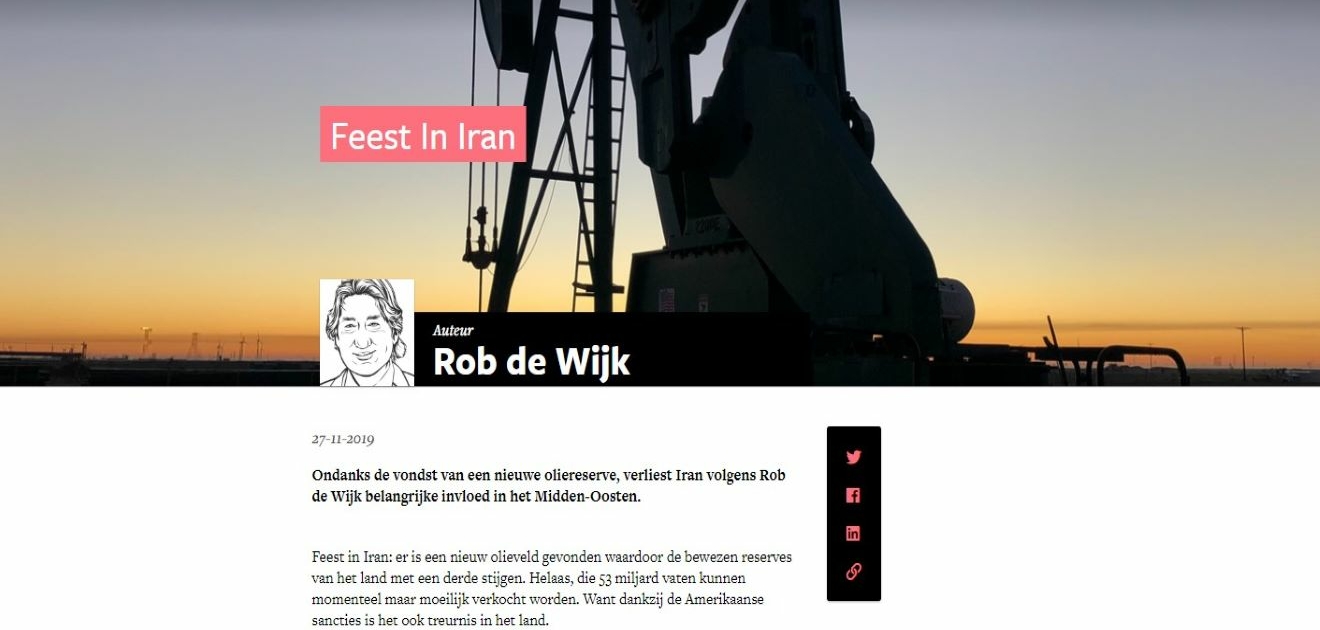Ondanks de vondst van een nieuwe oliereserve, verliest Iran belangrijke invloed in het Midden-Oosten, schrijft Rob de Wijk in zijn column voor Energiepodium.
Feest in Iran: er is een nieuw olieveld gevonden waardoor de bewezen reserves van het land met een derde stijgen. Helaas, die 53 miljard vaten kunnen momenteel maar moeilijk verkocht worden. Want dankzij de Amerikaanse sancties is het ook treurnis in het land.
Grote afnemers lopen olie uit Iran mis
Vanaf 2016 groeide de economie met 13 procent als gevolg van de Iran-deal waarmee de Ayatollahs afzagen van de ontwikkeling van kernwapens. Maar in mei 2018 stortte de economie weer in toen president Trump de deal opzegde en sancties instelde die de olie-export trof. Weliswaar gaat er nog steeds olie naar China, Japan en India, maar er gaat niets meer naar grote afnemers als Griekenland en Italië. Het gevolg is dat de Iraanse economie volgens het IMF met ongeveer 10 procent krimpt. Alleen Libië (-19 procent) en Venezuela (-35 procent) doen het slechter. Opvallend genoeg zijn dat ook oliestaten die net als Iran, als ze goed bestuurd worden schatrijk zouden moeten zijn. Toch staat de Iraanse economie niet echt op instorten. Die wordt veel meer zelfvoorzienend.
Rellen door inflatie: voedsel in Iran 80% duurder
De inflatie is in Iran buiten proporties: 35,7 procent. Voedsel is alleen al 80 procent duurder geworden. Die prijsstijgingen raakten vooral de bewoners in de rurale gebieden.
Het is dan ook niet gek dat er in het hele land rellen zijn uitgebroken. De vlam sloeg in de pan toen de benzineprijzen met 50 procent stegen. Inmiddels zijn ruim honderd mensen omgekomen. Om de protesteerders, volgens de opperste geestelijke leider Ali Khamenei ‘misdadigers’, in de hand te houden, werd het internet afgesloten. Zijn Revolutionaire Garde dreigt met ingrijpen.
In Iran klaagt men meer over wanbestuur dan over de Amerikaanse sancties
Interessant is dat de protesten zich ook steeds meer tegen de leiders richten. Sterker, er schijnt meer te worden geklaagd over wanbestuur dan over de Amerikaanse sancties.
Maar het meest opmerkelijke nieuws is dat uit uitgelekte geheime documenten Irak en Libanon vazalstaten van Iran zijn. Iran bepaalt daar wie het voor het zeggen heeft en welke groepen worden gesteund. In Libanon is dat de terreurbeweging Hezbollah en in Irak is dat de Fatah-coalitie. Tegen deze inmenging is nu een opstand gaande, waarbij de afloop vooral voor oliestaat Irak van belang is. De opstandelingen in Libanon, Syrië en Iran delen hun afkeur tegen incompetent en corrupt bestuur, de stijgende prijzen en de falende basisvoorzieningen. In Libanon en Irak onttrekt de opstand zich aan sektarische en religieuze lijnen. Voor het Midden-Oosten is dat bijzonder.
Plan van de ayatollahs om Midden-Oosten naar zich toe te trekken ligt in duigen
Niet de Amerikaanse sancties, maar de opstanden in de satellietstaten zouden de positie van Iran wel eens kunnen aantasten. Die satellietstaten waren bedoeld om het initiatief in het Midden-Oosten naar zich toe te trekken, welgevallige leiders in het zadel te houden, de Amerikaanse invloed te verminderen en de export van olie aan te wenden voor economische kracht. Dat plan ligt nu in duigen. Want de Ayatollahs hebben verzuimd een sociaaleconomisch plan te ontwikkelen dat hun positie in eigen land versterkt en Irans invloed in Libanon en Irak rechtvaardigt. Dat sociaaleconomische plan kan er alleen komen als de sancties worden opgeheven en de olie-export op gang komt. Maar door het uitlekken van die geheime documenten zullen de sancties eerder verzwaard dan verlicht worden. Daardoor zullen de verdiensten uit dat nieuwe olieveld wel even op zich laten wachten.
Rob de Wijk is directeur van The Hague Centre for Strategic Studies (HCSS) en professor Internationale Betrekkingen aan de Universiteit Leiden. In zijn column voor Energiepodium gaat hij in op de energievoorziening in het licht van de internationale verhoudingen.






